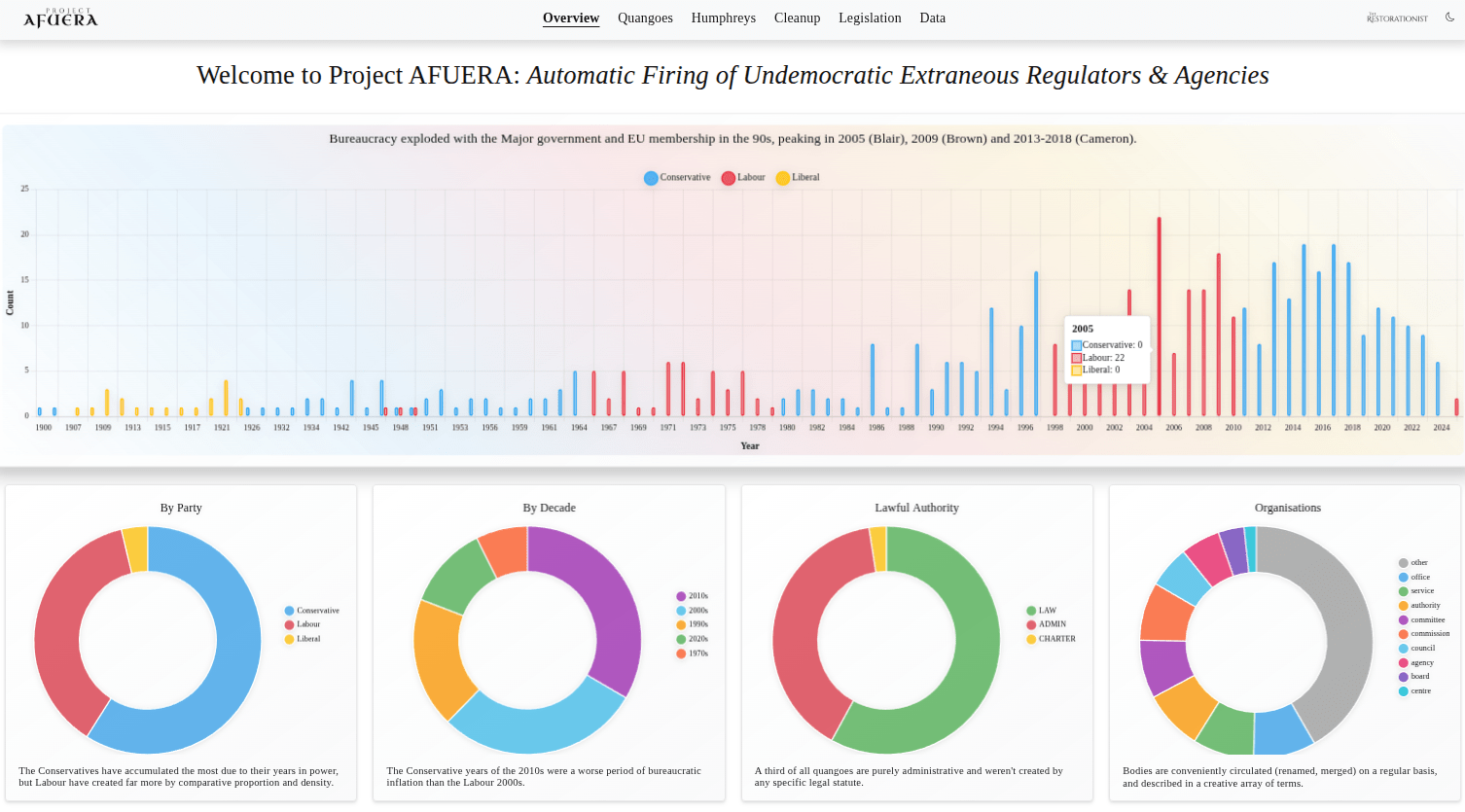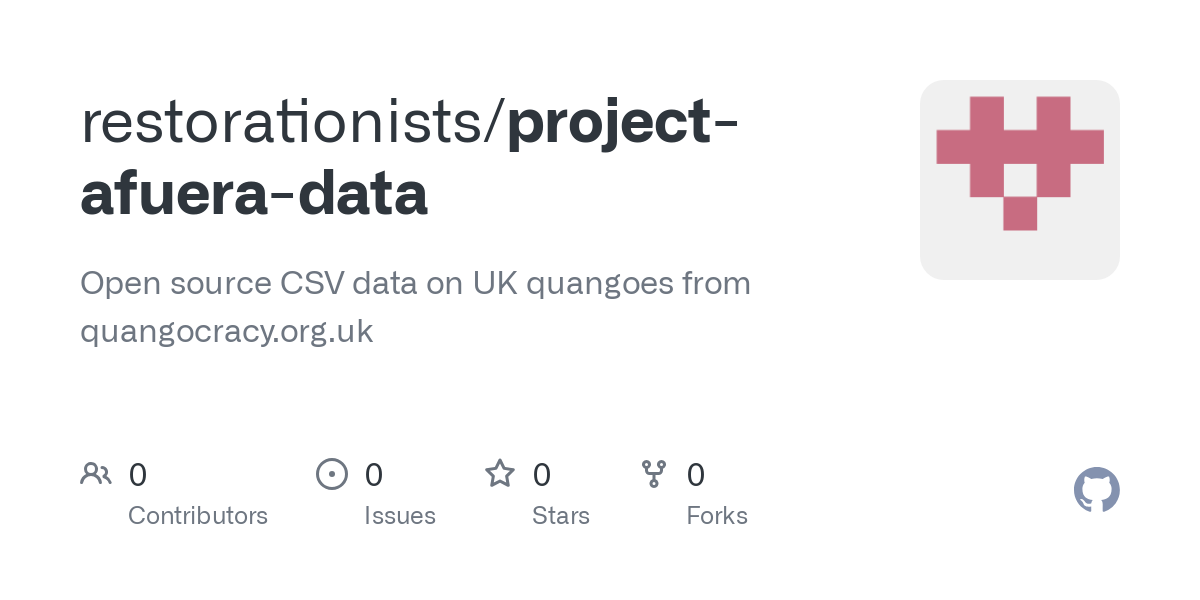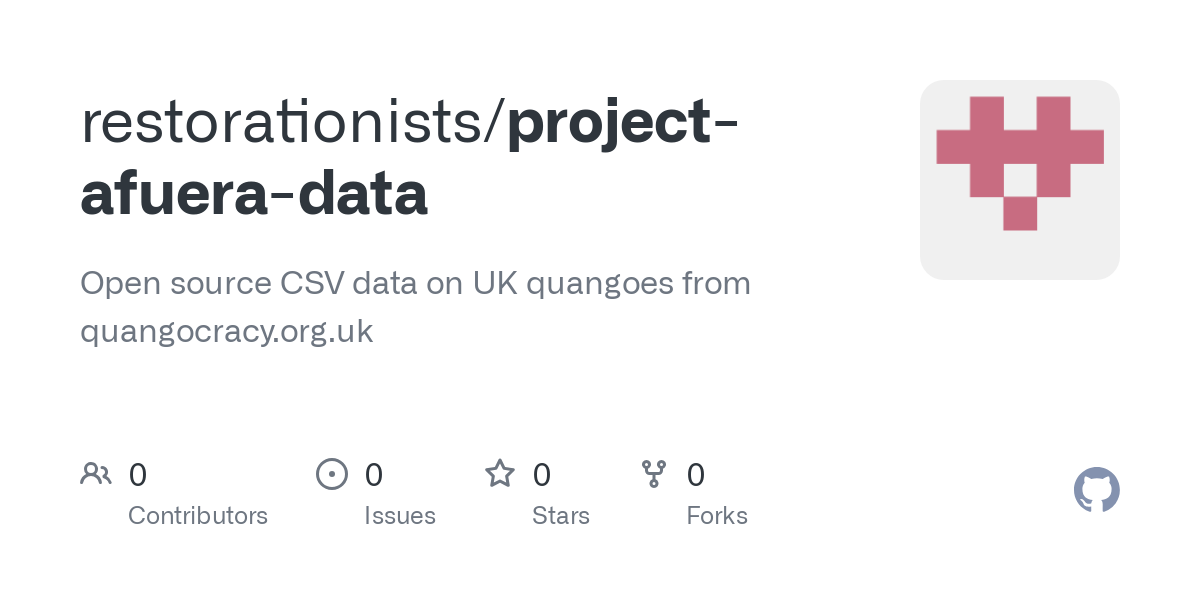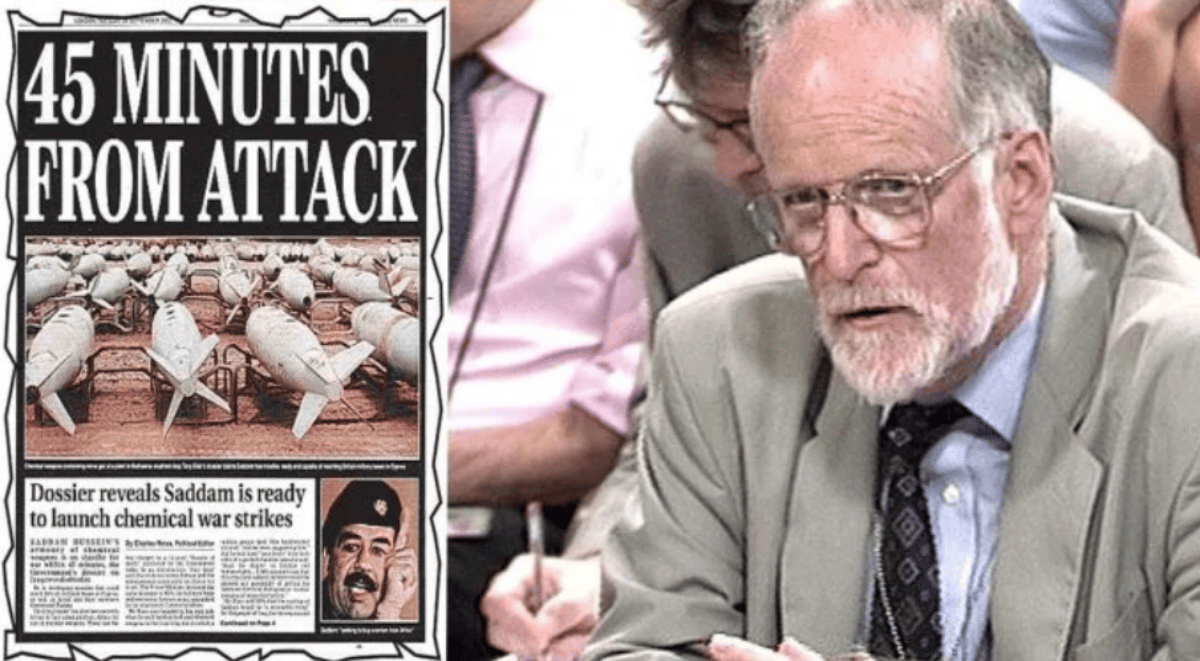Project AFUERA & the RoBO Act
A massive open source data analysis for the UK's own "Automatic firing of undemocratic extraneous regulators and agencies" has been published on quangocracy.org.uk by the Restorationist and reveals alarming numbers. With a way to fix it all.

The word "soviet" in Russian means "council." Since the end of WWII, the British state has been deliberately hollowed out from a supreme Parliament of representatives to a network of faceless councils and committees. Working together, one might call it a union of soviets. The "quango" or "quasi-autonomous non-governmental agency" is an umbrella term describing the many species of organisation which operate in this way.
Perhaps this is deliberate as it's helpful for opaqueness; more likely it's a Westminster herd of cats with no idea what is going on. The simple fact is a staggering amount of Parliament's functions have been outsourced by lazy MPs to bureaus, most of whom ordinary people have zero participation in or influence over.
The Public Bodies Act 2011 attempted to clear out must of the muck, but was ignored, strung out, and toothless. The Institute for Government was most upset. The Cabinet office claimed it had removed 378 of them, but the number has now doubled since many abolitions were widely repealed. The Home Grown Timber Advisory Committee and Agricultural dwelling-house advisory committees for areas in England didn't make it. The Environment Protection Advisory Committees were too important for us to lose, apparently.
The Headlines: How Bad Is it?
You can find all the data and its visualisations on https://quangocracy.org.uk/. It's alarming, harrowing, and demoralising, frankly. "Afuera!" is obviously a tongue-in-cheek callback to President Javier Milei's infamous video during his election campaign.
Quangoes have dripped out of government offices and parliamentary laws at a steady rate for 200 years, generally averaging no more than 5 a year. But then, the EU happened. Beginning with Major's government in the early 1990s, quango creation accelerated quickly to match European bureaucracy. By 2003 it was out of control. It peaked in 2005 (22), 2009 (18), but was fully flourishing from 2013 to 2018 (15-20 per year).
59% of quangoes were created under a Conservative government, compared to 37% under Labour; however the former have had many more years in power. The absolute worst periods were the 2010s (34%) and the 2000s (29%), but the 1990s produced 19% of them. 89% of them affect the whole UK, but a particular area of horror is the devolved Northern Ireland government (6%). The suspects are as expected: Blair (107), Cameron (85), Major (57), May (45), and Brown (43).
58% of them were brought to life by primary or secondary legislation, but 40% of them were created administratively by mandarins. The Cabinet Office, Department of Culture, Media and Sport, DEFRA, defence, justice - all equal offenders.
When it becomes interesting is the quasi-anonymous individuals who created this maze of ignominy. The same names reappear consistently: Jeremy Heywood, Nicholas Macpherson, Gus O'Donnell, Robin Butler, Simon Case, Richard Wilson, Tom Scholar, Andrew Turnbull, Terence Burns, Hayden Phillips, Mark Sedwill, and Chris Wormald.
The worst of the worst:
- Regulatory Policy Committee (Regulates whether more regulations are needed)
- Scientific Advisory Committee on the Medical Implications of Less-Lethal Weapons (Helps determine whether tasers are dangerous)
- Plant Varieties and Seeds Tribunal (Hears complaints about plants)
- Submarine Delivery Agency (Currently dismantling old submarines)
- UK Commission on Covid Commemoration (Advising on how to remember Covid lockdowns)
- UK Resilience Academy (Trains civil servants in how to cry less)
- UK Council for Internet Safety (Creates internet rules for other people's children)
- Groceries Code Adjudicator (Complains to supermarkets if they don't pay their suppliers)
- Independent Anti-slavery Commissioner (Ensures the only nation to abolish slavery doesn't have too many slaves)
- Migration Advisory Committee (Produces reports on how much mass immigration is required)
The most appalling civil servants:
- MACPHERSON, Nicholas (165, Baron)
- ODONNELL, Gus (130, Baron)
- HEYWOOD, Jeremy (127, Baron)
- BUTLER, Robin (87, Baron)
- SCHOLAR, Tom (84, Knighthood)
- TURNBULL, Andrew (59, Baron)
- BURNS, Terence (57, Baron)
- CASE, Simon (44, CVO)
- WILSON, Richard (38, Baron)
- TREND, Burke (35, Baron)
- SEDWILL, Mark (34, Baron)
- MIDDLETON, Peter (31, Knighthood)
- BRIDGES, Edward (27, Baron)
- BOWLER, James (27)
- ARMSTRONG, Robert (22, Baron)
- WASS, Douglas (21, Knighthood)
- BROOK, Norman (21, Baron)
- ALLEN, Douglas (21, Baron)
- HUNT, John (18, Baron)
- HANKEY, Maurice (17, Baron)
Case was recently rewarded with a peerage despite the despair over his behaviour.
No Data, No Problem
It's unusually difficult to find out how many quangoes the UK actually has. The estimates differ so widely, it's tricky to get an accurate figure. The Guardian think it is more than 300; The ICAEW thinks it is 603. The Taxpayers Alliance still quotes 192. Liz Truss says it's more than 500. They are created randomly by administrative fiat, or burrowed into obscure clauses of law to be laundered under multiple names: council, commission, agency, office, authority, board, service, ad nauseam.
Where's the list?
In the absence of any real alternative, the only sane place to start is the government's own list of departments, agencies and public bodies. The list of 604 organisations is, unsurprisingly, out of date, thanks to the labyrinth of infinite moves and mergers. Ungrouping this mess is not as straightforward as it seems: Companies House, for example, used to have its own website. Many departments are holding pages left with a note a department no longer exists.
It's important to note this only counts the bodies which are currently active, and not those abolished by the 2011 Act. The true tally is likely much, much worse.
Is the Bank of England a quango? MI6 is now a LGBT support organisation with a spy club attached in the absence of a Cold War to fight, so it certainly qualifies.
Many of them have a Wikipedia page and a dedicated website. And a lotof them are out of date. So it's a manual Google to get the URLs, and batch jobs in ChatGPT to fact-check each one.
When were they launched?
The next problem, as any intrepid explorer will discover, is it's virtually impossible to figure out when these governmental tumours emerged. The state's own notes are wrong and out of date. Sir Humphrey isn't forthcoming about when a bloated committee was dreamt up in the Cabinet Office. Ascertaining a rough year is an inexact science, for the simple reason a law often doesn't come into effect the same one it was passed, and quangoes have often been in operation for a decade previously.
That means going through every single one, and looking up the date manually. A serious slog. The creation year is the skeleton key for unlocking everything else.
Who are these Sir Humphreys?
Finding a list of guilty parties is trickier than it looks. The Civil Service maintains an annual yearbook of its offending individuals, but it's not particularly accessible.
Luckily, a helpful chap named Colin Mackie maintain a list of them since 1900 in a simple MS Word doc online. Task #1 for the large language model and some code to produce a nicely ordered CSV file. The 20% not covered in there need to be filled in manually.

Who created them?
The first stage here is working out which Prime Minister is the guilty party. Once we have the year, it's straightforward - ish. Match the date of the quango – legislation or the noted start date - to the list of PMs. This isn't exact, but it's good enough.
The Cabinet Secretary is quite similar. Take the year and match it to the list of secretaries. Quite why we need this position, nobody knows. This part is quite revealing.
The last two are somewhat trickier. We need the names of the permanent secretary ("PS") for the Treasury (the money man who signed off on the budget) and the department secretary (the Humphrey who midwifed it). Many of the departments have been abolished or renamed, so it requires a manual matching process. Using our list of quangocrats, it's fairly easy to match them the same way.
Now the last part is very revealing indeed. Permanent secretaries don't get a lot of attention and tend to stay anonymous. And you can see why: patterns begin to emerge.
What on earth do they do?
The amount of insufferable jargon these organisations employ to obscure how little they do is awe-inspiring. It's truly impressive. Take this lightweight example:
We assess the quality of evidence and analysis used to inform regulatory proposals affecting the economy, businesses, civil society, charities and other non-government organisations. Our independent advice and scrutiny helps ensure that ministerial policy decisions are based on accurate evidence, and helps to produce better regulation.
What the hell does that mean?
This is where large language models shine. Our setup can take in large amounts of text at once and produce accurate, human-readable sentences to parse the BS. Result:
Reviews the cost and impact of new UK regulations.
Do they come from Sir Humphrey's imagination or a law?
Easily the hardest part is identifying the origin of these soviet units. It's a long, long slog, and mainly because of the enormous amount of legislation. Some are easy to pinpoint, such as the Committee on Climate Change. It's in Schedule I of the Act.
The Committee shall consist of—
(a)a person appointed by the national authorities to chair the Committee (“the chair”), and
(b)not less than five and not more than eight other members appointed by the national authorities.
The Committee on Toxicity of Chemicals in Food, Consumer Products and the Environment, however, has no legislation behind it. It's administrative. Many of these are spawned out of renaming, merging, and blatantly abusing taxpayer money to establishing "working groups" which later get redefined or statutory footing.
The hardest of all are the nefarious ones created by murky secondary legislation: regulations, orders, and so on. Many of these bills contain slimy wording along the lines of "the Minister may, by regulations, create any administrative division he sees fit to fulfil the objectives of the Act." An example is the Security Industry Authority.
While the enabling Act (primary legislation) provided the legal basis, the formal establishment and operational powers of the SIA were enacted via a Statutory Instrument, the Security Industry Authority (Commencement and Transitional Provisions) Order 2003 (SI 2003/43). These tedious, boring, labyrinthe papers sit quietly in the background. spawning billions of pounds of waste. Built in here is the question of whether the quango was created in 2001, or in 2003. If in doubt, the guilty mind should be the date.
Noting the URLs of the primary and secondary URLs is crucial for interrogating the terrible legislation API.
Why no budget or personnel?
For one simple reason: for our purposes, we don't care. Budgets change every year, and they are heavily obfuscated in multiple ways. The Cabinet Office doesn't publish details of internal "working groups," and the Ministry of Defence often simply folds entire divisions into its operating budget. There aren't a lot of reliable datasets or numbers given by the Treasury. For good reason – we'd be rather angry if we knew what they were wasting 25% of our paycheck on.
Headcount is harder. Some departments publish numbers, some don't. It varies from month-to-month. Plus, it's irrelevant other than to know how many people are uselessly employed with taxpayer funds.
The finalised list
It's not rocket science. A simple spreadsheet of 570+ rows with a lot of columns ready to be imported into SQLite for basic queries.

Pulling the CSV data into SQLite (or maybe even Grafana), we can run some basic SQL to obtain statistics. For example, who are the worst treasury secretary offenders of them all?
SELECT
TRIM(TREASURY_PS) AS treasury_secretary,
COUNT(*) AS total
FROM
quangoes
WHERE
TREASURY_PS IS NOT NULL AND TRIM(TREASURY_PS) != ''
GROUP BY
treasury_secretary
ORDER BY
total DESC;Keep, Abolish, Consolidate, Convert
The real meat of the work is concerned with getting rid of these things. Some of them are so utterly absurd it defies belief:
The Tribunal makes decisions about national listing of new varieties of plants, UK plant variety rights and certain forestry matters.
Some are integral to the realm, such as the Royal Mint.
We could use a decision tree, a decision matrix, a Markov chain, or any other of numerous methods to arrive at how to dispose of Sir Humphrey's meddling. Fundamentally, our outcomes are:
- KEEP --> NO FURTHER ACTION (green)
- KEEP --> CONVERT (orange)
- ABOLISH --> NO FURTHER ACTION (red)
- ABOLISH --> CONSOLIDATE (red)
- ABOLISH --> CONVERT (orange)
The abolition reasons become repetitive, and reveal a pattern of the Blob's belief the state can manage things better than the market, regulation should replace suing in court, and MPs shouldn't really have to do anything:
- Inappropriate outsourcing of Parliament's function.
- No need for a specialised division.
- Should be resolved through standard contract law and private arbitration.
- Can be adsorbed into a new scientific entity.
- Should not be under state control/sponsorship.
- Government should purchase services like any other client.
- Government has no business offering retail financial products.
Keep
Simple enough. It doesn't need fixing because it's already a private company or fills a crucial role.
- HM Passport Office
- Porton Biopharma Limited
- etc
Abolish
As beautifully put by Dorothy Wainwright in Yes Minister:
Get rid of it! Abolish it! Remove it! Expunge it! Eliminate it! Eradicate it! Exterminate it! Get rid of it!
- Horserace Betting Levy Board
- Independent Commission for Aid Impact
- Independent Reconfiguration Panel
- etc
Do we really need a Higher Education Statistics Agency when the universities can do it themselves?
Consolidate
It's not always a simple clear cut case of nuking something when it may be doing something useful. Many of the committees and councils have inappropriately usurped functions which belong elsewhere. They can be transferred.
- Parliament (too long to list)
- Ordinary courts (too long to list)
- Foreign Office (Office of Financial Sanctions Implementation, Office of Trade Sanctions Implementation, Wilton Park)
- Police (Border Force, Civil Nuclear Constabulary, Gangmasters and Labour Abuse Authority, Independent Anti-slavery Commissioner, National Counter Terrorism Security Office, National Crime Agency, NHS Counter Fraud Authority, Parades Commission for Northern Ireland, Serious Fraud Office)
- Coastguard (Northern Lighthouse Board, Trinity House)
- HM Prisons (Northern Ireland Prison Service Parole Board Probation Board for Northern Ireland Probation Service, Youth Custody Service)
- MI5/MI6/GCHQ (Accelerated Capability Environment, HM Government Communications Centre, National Cyber Force, National Cyber Security Centre, National Protective Security Authority, National Security and Intelligence, National Space Operations Centre, UK National Authority for Counter-Eavesdropping)
- Military (Advisory Group on Military and Emergency Response Medicine, Atomic Weapons Establishment, Defence Equipment and Support Defence Infrastructure Organisation Defence Nuclear Organisation, Defence Nuclear Safety Expert Committee Defence Safety Authority, King's Harbour Master, Military Aviation Authority, Strategic Command, Submarine Delivery Agency, The Oil and Pipelines Agency)
- ARIA (Defence and Security Accelerator, Defence Science and Technology Laboratory, jHub Defence Innovation, Nuclear Research Advisory Council, Regulatory Horizons Council, UK Space Agency)
- Companies House (Company Names Tribunal, Office of the Regulator of Community Interest Companies)
- UK Investments (British Technology Investments Ltd, UK Asset Resolution Limited, UK Infrastructure Bank (National Wealth Fund), UK Integrated Security Fund)
- Royal Mint (British Hallmarking Council, Royal Mint Advisory Committee)
- etc
In this vein, it becomes apparent it's easy to group some of these into new public benefit companies which can actually be making money instead of spending it by charging the government or others for management and services:
- British Earth Sciences Corp (weather, mapping etc.)
- Cabinet Office Board
- Centre for Environment
- Environment Agency
- Flood and Coastal Erosion Risk Management Research and Development Programme
- Flood Forecasting Centre
- Government Geography Profession (CS)
- HM Nautical Almanac Office
- Marine Management Organisation
- Met Office
- National Physical Laboratory
- Ordnance Survey
- UK Hydrographic Office
- UK National Investigations Corp (accidents, crime, etc.)
- Air Accidents Investigation Branch
- Health Services Safety Investigations Body
- HM Inspectorate of Prisons
- HM Inspectorate of Probation
- Independent Case Examiner
- Independent Complaints Reviewer
- Independent Office for Police Conduct (IPCC)
- Marine Accident Investigation Branch
- Rail Accident Investigation Branch
- UK Nuclear Development Corp (labs, cleanup etc.)
- Great British Nuclear
- Nuclear Decommissioning Authority
- Nuclear Restoration Services
- Nuclear Waste Services
- UK Atomic Energy Authority
- UK Industrial Fusion Solutions
- United Kingdom National Nuclear Laboratory
- UK Scientific Standards Corp (taxonomies, rules etc.)
- Administration of Radioactive Substances Advisory Committee
- Advisory Committee on Animal Feedingstuffs
- Advisory Committee on Novel Foods and Processes
- Advisory Committee on Releases to the Environment
- Advisory Committee on the Microbiological Safety of Food
- Agri-Food and Biosciences Institute (Northern Ireland)
- Animal and Plant Health Agency
- Animals in Science Committee
- British Pharmacopoeia Commission
- Commission on Human Medicines
- Committee on Mutagenicity of Chemicals in Food, Consumer Products and the Environment
- Committee on Radioactive Waste Management
- Committee on Toxicity of Chemicals in Food, Consumer Products and the Environment
- Food Standards Agency
- Forest Research
- Government Chemist
- Government Veterinary Services
- Independent Medical Expert Group
- Medicines and Healthcare Products Regulatory Agency
- Science Advisory Committees
- UK Health Security Agency
- UK National Screening Committee
- Veterinary Medicines Directorate
- Veterinary Products Committee
- UK Transport Safety & Registry Corp (aviation, rail etc.)
- Civil Aviation Authority
- Driver and Vehicle Licensing Agency
- Driver and Vehicle Standards Agency
- Traffic Commissioners for Great Britain
- Vehicle Certification Agency
Convert
Many organisations are simply run by the wrong people or in the wrong corporate structure. They can be easily moved to profitable trading.
- Charitable Company Limited by Guarantee (CHR)
- All the museums
- Charitable Incorporated Organisation (CIO)
- Historic England
- Legal Aid Agency
- Official Solicitor and Public Trustee
- The Theatres Trust
- Charitable Trust (CT)
- Chevening Scholarship Programme
- Community Benefit Society (COMBEN)
- All the national parks
- British Wool
- Churches Conservation Trust
- Intellectual Property Office
- National Rail
- Co-operative (COOP)
- British Cattle Movement Service
- Electricity Settlements Company
- National Employment Savings Trust (NEST) Corporation
- Community Interest Company (CIC)
- Advisory Council on the Misuse of Drugs
- Architects Registration Board
- Board of Trustees of the Royal Botanic Gardens Kew
- Disclosure and Barring Service
- East West Railway Company Limited
- Ebbsfleet Development Corporation
- Gov Facility Services Limited
- HM Land Registry
- National Energy System Operator
- Salix Finance Ltd
- Limited Liability Partnership (LLP)
- Bona Vacantia
- Judicial Office
- Remploy Pension Scheme Trustees Ltd
- Mutual Insurance Company (MIC)
- Flood Re
- Private Company Limited by Guarantee (LTD-GT)
- BBC World Service
- Private Company Limited by Shares (LTD-SH)
- British Business Bank
- Channel 4
- District Valuer Services
- Great British Energy
- High Speed Two (HS2) Limited
- NS&I
- Queen Elizabeth II Conference Centre
- S4C
- Public Benefit Corporation (PBC)
- BBC
- British Council
- British Library
- Higher Education Statistics Agency
- National Highways
- Office for National Statistics
- Post Office
- Student Loans Company
- The Charity Commission
- The Crown Estate
A clear example here are national parks. These are obviously Community Benefit Societies, and need to be managed by local parish councils.
The Final Cleanup
We're left with 40 bodies, or around 7% of the original list:
- Advanced Research and Invention Agency
- Armed Forces Covenant Fund Trust
- Bank of England
- British Earth Sciences Corp (PBC)
- Companies House
- Corporate Officers of the House of Commons
- Corporate Officers of the House of Lords
- DfT Operator Limited
- Fleet Air Arm Museum
- Government Analysis Function (CS)
- Government Communications Headquarters
- Government Debt Management Function (CS)
- Government Economic Service (CS)
- Government Legal Department (CS)
- Government Property Agency
- Historic Royal Palaces
- HM Courts & Tribunals Service
- HM Passport Office
- HM Prison and Probation Service
- HM Revenue & Customs
- London and Continental Railways Limited
- Maritime and Coastguard Agency
- National Archives, The
- Policy Profession (CS)
- Porton Biopharma Limited
- Reclaim Fund Ltd
- Royal Mint
- Scientific Standards Corp (PBC), UK
- Secret Intelligence Service
- Security Service
- Sellafield Ltd
- Sheffield Forgemasters International Ltd
- Transport Safety & Registry Corp (PBC), UK
- UK Government Investments
- UK National Investigations Corp (PBC)
- UK Nuclear Development Corp (PBC)
- UK Scientific Standards Corp (PBC)
- UK Transport Safety & Registry Corp (PBC)
- UK Visas and Immigration
- Veterans UK
The crude data can be viewed and modified is a simple CSV:

The Restraint Of Bureaucratic Overreach Act
It's not enough to simply list these things. Parliament shows its will through legislation, and that means a bill. The answer is the Restraint of Bureaucratic Overreach Act, or ROBO. The Act is ruthless and undertakes political entrenchment to a new level, while putting a straitjacket on civil servants.
A new offence of "administrative obstruction" is brought to life, which might as well be called the "F**k you, Sir Humphrey" barrier.
Administrative obstructionism is any deliberate behaviour by a public servant or contractor which frustrates or delays government policy or the Act’s implementation beyond what is reasonably necessary for legal or operational reasons.
- Anyone working for or contracted by the government—civil servants, consultants, agents, advisers, etc.
- Any wilful act, omission, or pattern of conduct that causes delay or disruption without legitimate operational need.
- Creating unnecessary approval processes or meetings.
- Delaying decisions by invoking overly strict compliance or legal processes.
- Requiring excessive paperwork or multiple sign-offs.
- Misrepresenting legal or policy requirements to stall implementation.
- Withholding information or selectively disclosing it to undermine policy goals.
- Using professional codes or procedural objections to avoid executing clear ministerial instructions.
- Exemptions: Good-faith efforts to comply with criminal law or genuine legal obligations, but even these require written ministerial approval if delay exceeds 14 days.
- If someone is found doing this twice in 12 months, the burden shifts: they must prove further delays are justified (Section 2A).
- Obstructionism is a criminal offence punishable by:
- Up to 2 years’ imprisonment or
- A £500,000 fine
- Plus automatic disqualification from public employment for 25 years
- Civil penalties and salary deductions may also apply.
Part 1: General Principles and Constitutional Supremacy
- Section 1: The Act is called the ROBO Act and becomes law the day after Royal Assent (except Part 5, which is delayed 6 months).
- Section 2: Broad definitions prevent legal loopholes (e.g. “administrative obstructionism” includes any willful delay tactics by public servants; “public body” includes almost any publicly funded or functionally governmental entity).
- Section 2A: Reverses the burden of proof for repeat obstructors, requires legal opinions for delay, and allows ministerial override after 30 days.
- Section 3: Establishes a “minimal state” principle. All interpretations must favour abolition, privatisation, and deregulation. The Act overrides any conflicting laws, treaties, or precedents.
Part 2: Restrictions on Creation and Expansion
- Section 4: No new public body can be created except via a standalone Act passed by a ¾ supermajority in both Houses. Anything else is void and recoverable personally.
- Section 5: Hard caps: max 50 public bodies and 100,000 employees. Breaching the cap auto-dissolves newest entities. A public register must be maintained by a private company.
- Section 6: Temporary bodies during emergencies are allowed for 6 months only, under strict definitions (e.g. 1000+ deaths, £1bn+ damage). No renewals or successors.
- Section 7: Any new public body must meet extreme standards—e.g., prove £100m net annual benefit, no private alternative exists, full costed plan, third-party audit, etc. Only standalone bills allowed.
Part 3: Universal Sunset Clauses and Automatic Dissolution
- Section 8: All public bodies must automatically dissolve after 36 months unless renewed by another ¾-majority standalone Act (only once ever). No sunset extensions.
- Section 9: Every body must have measurable failure conditions (e.g. 25% cost cuts/year, 60% revenue self-sufficiency). Failure = automatic dissolution in 30 days.
- Section 10: Upon failure/sunset, bodies shut down irrevocably. No injunctions allowed. All contracts and functions lapse. Reuse is banned for 10 years.
- Section 10A: Requires pre-dissolution forensic audits to detect “anticipatory reconstitution” (e.g., quiet rebirth via renamed teams or backdoor hiring).
Part 4: Mass Abolition and Strategic Conversion
- Section 11: Abolishes all bodies listed in Schedules 2–8 and repeals legislation in Schedule 9. No appeals, reviews, or transition protections.
- Section 12: Repeals the BBC licence fee completely.
- Section 13: Transfers of functions and assets are limited to those explicitly listed; anything else lapses. No re-employment rights.
- Section 14: Strict ban on reconstituting abolished bodies. Reuse = crime. Former staff can’t do similar work for 10 years. Violators lose assets and status.
- Section 15: If devolution is reversed (e.g., Scottish Parliament abolished), devolved public bodies dissolve immediately, with no replacement.
As given in the guide to the bill, there are many principles built into it. Key concepts include:
- Asymmetric Mobilisation
- Calculus of Consent
- Ceremonial Conformity
- Concentrated and Diffuse Interests
- The Collective Action Problem
- Environmental Pressure
- "Hard Look" Review
- Market Discipline
- Mission Creep
- Moral Hazard
- Niche Elimination,
- Parkinson's Law
- Path Dependence
- Perverse Incentives
- Positive-sum Games
- Principal-agent Theory
- Privatise profit, socialise loss problems
- Regulatory Capture
- Rent-seeking Behaviour
- Requisite Variety
- Seed Dispersal
- Shirking Behaviour
- Structural Inertia
- Systems Theory
The Restraint of Bureaucratic Overreach Act is a structural response to the persistent failure of governments to control administrative expansion. Bureaucracies, by design, resist reform through procedural complexity, strategic compliance, and reconstitution of abolished functions under new guises. The failure of the Public Bodies Act 2011 illustrates how civil servants exploited weak enforcement and legal loopholes to preserve institutional continuity, aided by courts, parliamentary incentives, and diffuse public interest.
The ROBO Act departs from prior reform by redesigning the constitutional rules: it defines public bodies expansively, prohibits reconstitution, imposes burden-shifting on obstructive officials, and mandates that all interpretations favour abolition, privatisation, and speed. Creation of new bodies is procedurally prohibitive—requiring standalone Acts passed by supermajority—and subject to strict cost, performance, and lifespan limits. Universal sunset clauses ensure no body survives beyond three years without revalidation under the same conditions.
The Act also enforces mass abolition, blocks staff redeployment, and prevents functional continuity through charities, contractors, or academia. It dismantles the Crown employment model, reclassifying civil servants under market norms, at-will terms with enforceable oaths. Military functions are removed from civilian control, and essential technical roles are centralised in five strategic corporations bound by commercial rules. Procurement must favour small British firms, and new services must be self-funding or face automatic dissolution.
Personal and criminal liability mechanisms replace institutional immunity, ensuring bureaucratic obstruction has tangible individual consequences. Judicial review is narrowly confined, and repeal requires referendum or explicit electoral mandate. The Act is framed as constitutional engineering: an incentive-resetting mechanism to counteract bureaucratic survival instincts, restore parliamentary supremacy, and match state functions with democratic will and market discipline.








